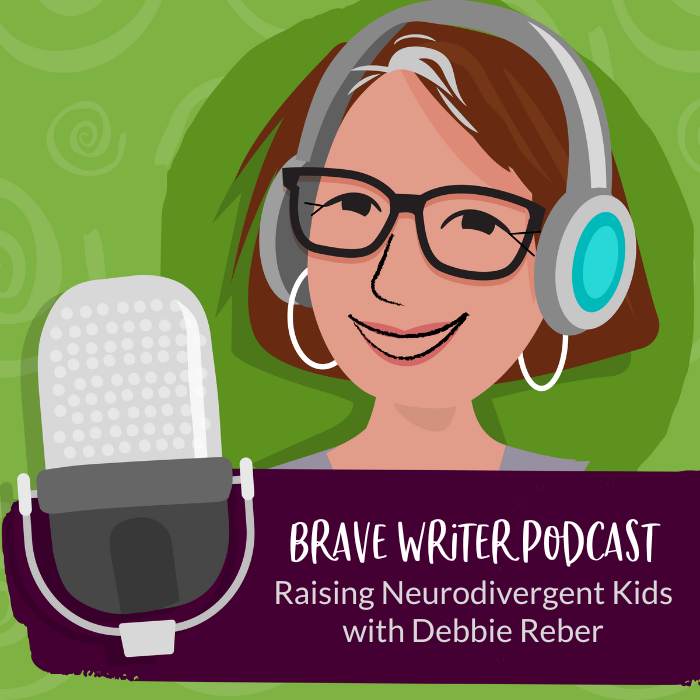Podcast: Raising Neurodivergent Kids with Debbie Reber

Debbie Reber knows firsthand how to navigate the journey of raising a neurodivergent child. As the founder of Tilt Parenting and author of Differently Wired Raising an Exceptional Child in a Conventional World, she shares her personal experience of homeschooling and helping other parents. Debbie’s goal is to provide support and resources for parents, caregivers, educators, and professionals.
Join us for today’s Brave Writer podcast as we discuss the different forms of neurodivergence and how they affect your family.
Show Notes
Debbie Reber shares her personal experience of homeschooling her son Asher, who is now an adult, and how she created her own website and podcast to help other parents navigate the journey of raising a neurodivergent child.
In the homeschooling community, many parents choose home education specifically for their differently-wired children. This was the case for Debbie as well. She believes that homeschooling chose her family, as they struggled to find a suitable educational environment for her son Asher, who is twice exceptional and has ADHD and other neurological differences.
Despite initial reluctance, Debbie began homeschooling Asher in third grade and found it to be a transformative experience for both her and her son. It allowed her to get to know him as a learner and as a person and helped her reframe her thoughts around neurodiversity. Debbie’s experience highlights the importance of finding an educational environment that truly fits the needs of differently-wired children.
Rethinking what it means to be a parent and family
Being a parent can come with a lot of societal expectations and pressure to conform to a certain mold of what a “successful” family looks like. For Debbie Reber, the founder of Tilt Parenting and author of Differently Wired, moving to a foreign country helped her strip away these expectations and find freedom in creating her own unique family vision. She found herself surrounded by families in Seattle participating in after-school sports, camps, and traditional family vacations, and she felt pressure and frustration when she couldn’t replicate that for her own family.
Moving abroad allowed her to break free from the comparison and expectations of others and make up her own rules for what works for her family. This included creating new rituals like going to the coffee shop and playing Minecraft together, and not worrying about what others thought. Debbie’s experience highlights the importance of finding what works for your own family and not getting caught up in societal expectations.
The value of diagnoses
Diagnosis can be an important tool for understanding and addressing the unique challenges faced by neurodivergent children. Diagnoses provide context and can help adults understand areas of challenge and strength, it also can give an individual sense of understanding about themselves and their challenges. It is important to remember that a diagnosis should not be seen as the solution, but rather as a way to provide better support for the child. In addition, in traditional school settings, a diagnosis can also help in getting support and services that can help the child in the classroom. Overall, evaluations and assessments can be a great tool for parents to understand their child’s unique needs and find ways to support them.
Giving kids a place to feel seen and heard
Finding a support group and community is essential for neurodivergent children, as they may feel isolated and different from their peers in traditional environments. Debbie suggests that it’s important for neurodivergent kids to spend time with others who are neurodivergent, so they can feel like they belong and understand that there are others like them. She also suggests that open communication and understanding about neurodivergence is important, as it helps to break down the idea that there is a “normal” group and an “outlier” group.
It is important to acknowledge that everyone is unique and has different strengths and weaknesses and that neurodivergence is just one aspect of a person’s complexity. By creating a more open and understanding environment, children can feel more comfortable being themselves and not feel like they have to fit into a certain mold.
When it comes to raising a differently-wired child, it is important to take a step back, trust your intuition, and not feel pressured to have all the answers right away. It’s important to give yourself time to process and not feel rushed into making any decisions. It is also important to remember that a diagnosis is just information and your child is not broken. Rather, it is a chance to get to know your child better and understand their unique strengths and challenges. Trust your intuition. Don’t feel pressured to conform to societal expectations, but rather support your child in a way that is aligned with your values and what you know to be true about your child.
Resources
- Learn more at: https://tiltparenting.com
- Podcast: https://tiltparenting.com/podcast
- 10 Things You Need to Know About Raising a Differently Wired Child video series: https://tiltparenting.com/10things
- 7-Day Challenge: https://tiltparenting.com/7day
- Facebook: https://facebook.com/tiltparenting
- Instagram: https://instagram.com/tiltparenting
- Twitter: https://twitter.com/tiltparenting
- Read: Differently Wired: Raising an Exceptional Child in a Conventional World
- Sign up for our Text Message Pod Ring to get podcast updates and more!
- Want help getting started with Brave Writer? Head over to bravewriter.com/getting-started
- Sign up for the Brave Writer newsletter to learn about all of the special offers we’re doing in 2022 and you’ll get a free seven-day Writing Blitz guide just for signing up: https://go.bravewriter.com/writing-blitz
Connect with Julie
- Instagram: instagram.com/juliebravewriter
- Twitter: twitter.com/bravewriter
- Facebook: facebook.com/bravewriter



















